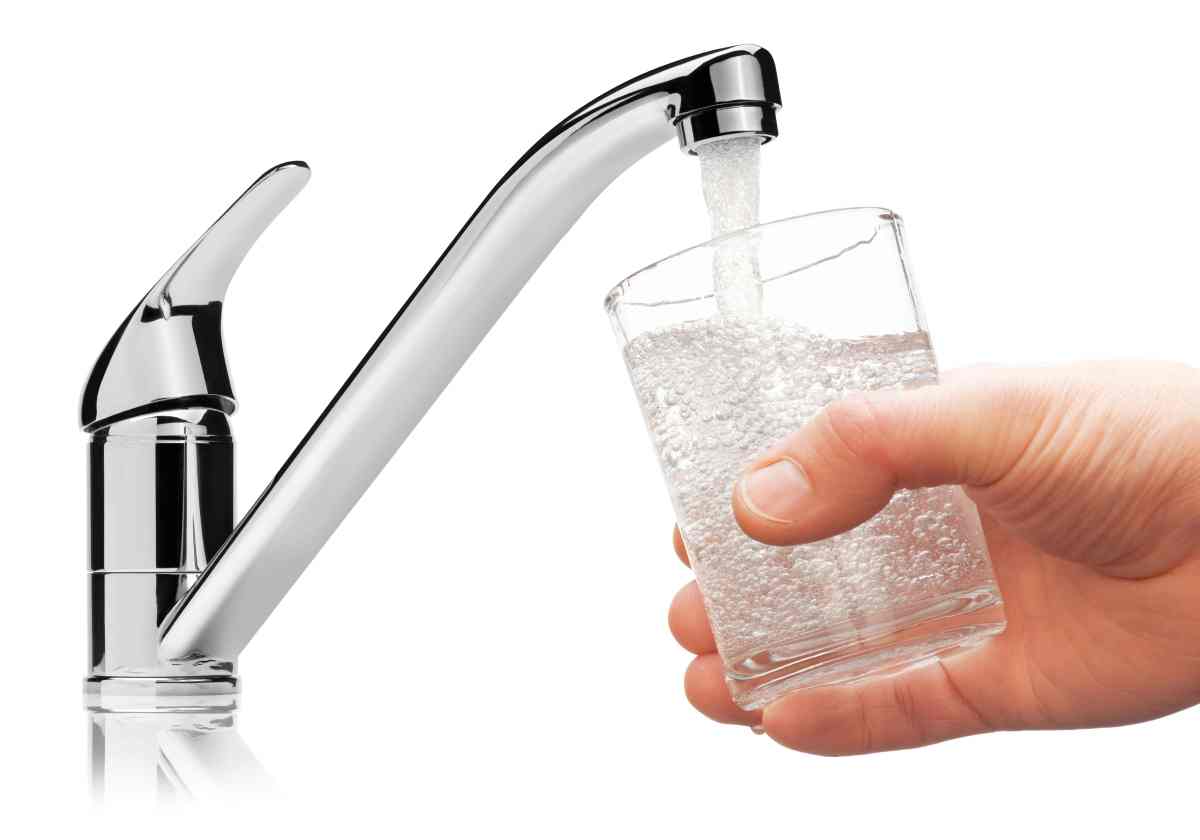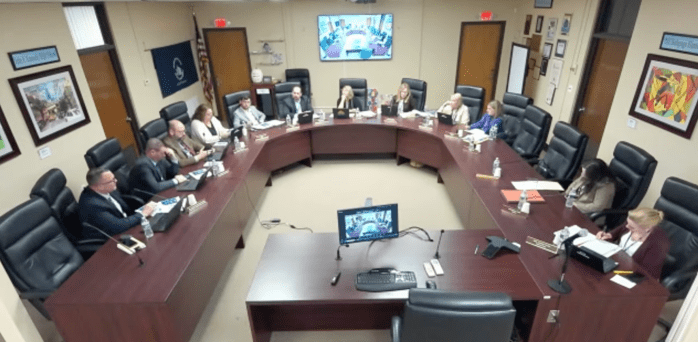A man conducting a free water test for New Jersey-based Aspen Water Solutions recently arrived in a Plainview home on Long Island with a suitcase and what appeared to be a chemistry kit.
Wearing a shirt with the words “Aqua Maven” along with The Home Depot’s bright orange logo as an authorized service provider, he whisked out a beaker, test tubes, and various reagents. He quickly turned a kitchen into a makeshift chemistry laboratory, testing for chlorine levels and substances dissolved in the water.
“Wow, baby. Look at you,” the man said in apparent shock. “This is your water unfiltered. This is what you’re drinking, cooking, and bathing in. I was not expecting that.”
The results of the chlorine test, he said, showed shockingly high levels that should worry anyone.
“Long Island’s water is probably the worst I’ve ever tested,” he said after testing for total dissolved solids, as transparent water became murky. “You have different issues all throughout Long Island.”
In addition to identifying the problem, he promised the solution in the form of a filter that he said would cost nearly $6,000.
“People are buying filtration systems,” the salesman who did the tests said as he took out fliers for filters and a Newsday article about problems with groundwater. “If you’re interested in fixing it, we can fix it very simply by putting a house filtration system on it.”
WATER WORRIES
While the pitch sounds scary, it may be based on more fear than fact. At this reporter’s request, he repeated the tests with Poland Spring bottled water, which became murky and, he said, performed poorly. But the test, not the water, may be where the trouble lies in this case.
Salespeople armed with proof of affiliations with The Home Depot are going door-to-door on the Island and elsewhere, testing water for free and making sales pitches for multi-thousand-dollar filters.
They target areas where legitimate ground water issues raise concerns in the news. LI, whose sole source of drinking water is a subterranean aquifer, has had more than its share of issues. And there are real concerns regarding water in the region.
Pollutants left over from Grumman and the U.S. Navy created a plume of toxins that have impacted some drinking water wells, for example. Newly identified chemicals such as 1,4-dioxane have also been found on Long Island. A New York State panel in mid-December recommended strict drinking water standards for contaminants used in making firefighting foam and household products that seeped into groundwater.
And those are just a few of the issues that have emerged.
TEST TROUBLE
Water suppliers are investing in high-tech methods to better filter water. This, however, doesn’t mean there are problems with water that is coming out of the taps in LI homes. Suppliers are installing high-tech filters designed to fix the problem before it gets to residents’ faucets.
“Once they [salespeople] perform the testing and the consumer sees their water through the testing, the water looks gunky,” says Brian Hancock, an attorney at Pensacola, Florida law firm Taylor, Warren & Weidner, who is suing The Home Depot, as well as the maker of the RainSoft filter and a distributor, in Florida, and Ohio. “It has a negative visual impact. They believe there is something wrong with their water.”
Aspen Water sells Brita/Pro softeners and filters, a different brand, and has nearly 4.5 out of five stars from HomeAdvisor.com and only two complaints to the Better Business Bureau over three years.
But officials said that these tests can function as sales tactics, designed more to alarm than to alert. And additional tests of the water Aspen tested revealed no issues.
Tests by the Plainview Water District on the same faucet used by the salesperson revealed results officials said are well within federal, state, and local regulations.
“We’re operating in standard. They don’t need a filtration system,” Joseph DiGregorio, a plant operator for the district, says. “You’re going to have individuals approach homeowners and convince people the water’s not safe and they need a filter. It’s a hard sell.”
Calls to Totowa, New Jersey-based Aspen Water Solutions were not returned and the man who did the tests declined to discuss the product or tests he did. Home Depot said it expects all tests to be ethical.
“Home Depot expects the service providers who sell these products and systems to do so in an ethical, honest, and straightforward way,” Margaret Smith, a company spokeswoman, says. “If any service provider uses unlawful, deceptive or misleading sales tactics, it’s unacceptable and will be dealt with.”
That, however, is what Hancock says is being done. The Home Depot is being sued for violations of Florida’s Deceptive and Unfair Trade Practices Act for free water tests done by firms affiliated with the retailer.
“Home Depot did not authorize, condone, ratify, or tolerate any illegal acts,” the firm said in court documents.
THE HOME TEST
While The Home Depot argues it isn’t doing the tests, attorneys suing the retailer see the firm as helping to open doors to what could be deceptive practices.
“The in-home water testing is the misconduct that is at the heart of our case,” Hancock says, noting it’s the test, not the equipment, that is his lawsuit’s focus.
The Florida Attorney General’s office warns that consumers should “avoid free home water tests,” which can easily be designed to scare and sell.
“Some unscrupulous salespeople prey upon concerned consumers by using scare tactics and fraudulent practices to sell their water treatment devices,” according to the Florida Attorney General website.
While free, sometimes misleading water tests may be more common today than in the past, they are nothing new.
“Avoid ‘free’ home water tests,” the FTC noted as far back as 2013. “Offers to test the tap water in your home for free are almost always part of a sales promotion. More important, in-home testing does not provide the specific, in-depth analysis that is required to determine if your water needs treatment and what kind of system is suited to your needs.”
The FTC pointed out that “a wide variety of water treatment devices are available, ranging from relatively simple, low-cost filter devices for faucets to sophisticated and expensive systems that treat water from its point of entry into your home.”
The agency notes that “no water treatment device can solve every problem” and, even if you get a filter, it’s important to match it to your needs.
“Some systems only soften water by removing calcium and magnesium, while others eliminate virtually all minerals and foreign matter present in the water,” according to the agency.
Water supply officials say tests often are designed to make people afraid rather than to identify issues.
“All of our water meets very rigorous water control standards set by the state and federal government,” says Tim Motz, a spokesman for the Suffolk County Water Authority (SCWA), which serves 1.2 million residents.
CHLORINE QUESTIONS
Testers such as the one who evaluated the water in a Plainview home sometimes indicate small amounts of chlorine are problematic. Local water officials, however, said the absence of chlorine, used to purify water, could be a sign of trouble.
“The purpose of the chlorine is to prevent bacterial growth,” says Kevin Durk, director of water quality and laboratory services for SCWA. “You want chlorine to be present.”
DiGregorio says providers are “required to maintain a chlorine residue to prevent bacterial outbreak” and rebutted the idea that chlorine residue is a concern.
Chris Niebling, laboratory manager for SCWA, says water providers are required to test for about 150 compounds, but Suffolk tests for nearly 400.
“All our water will have some TDS (total dissolved solids), because there are naturally occurring minerals,” Niebling says. “It’s not a health hazard. You want naturally occurring minerals in there.”
Durk says “there could be good things in the water, such as minerals,” including magnesium, calcium, sodium, and potassium. While their presence would make water look murky in a test, some minerals may be desirable rather than dangerous.
SOFT SALES PITCH
Devices such as the Brita® Pro, which the tester in Plainview marketed, often are water softeners — filters that, local providers say, may not be necessary or helpful in this region, since local water is “soft,” without high mineral content.
“None of your dissolved solids in concentration exceed any limits,” DiGregorio says. “You don’t need to soften your water.”
Water providers do thousands of elaborate laboratory tests that are more detailed than the tests salespeople can do with their kits, suppliers say.
“Contact your water supplier or health department if you’re concerned,” Durk says. “They would test the water.”
Filters can leave beneficial minerals, but also may remove water impurities along with healthful minerals such as calcium.
The World Health Organization released a report stating that water stripped of all minerals “has a definite adverse influence on the animal and human organism.”
Filters can make water better, but also can make things worse, especially if improperly maintained.
“If you don’t change your filter on a regular basis … you can get a bacterial buildup,” Durk says. “It can cause more harm than good.”

































